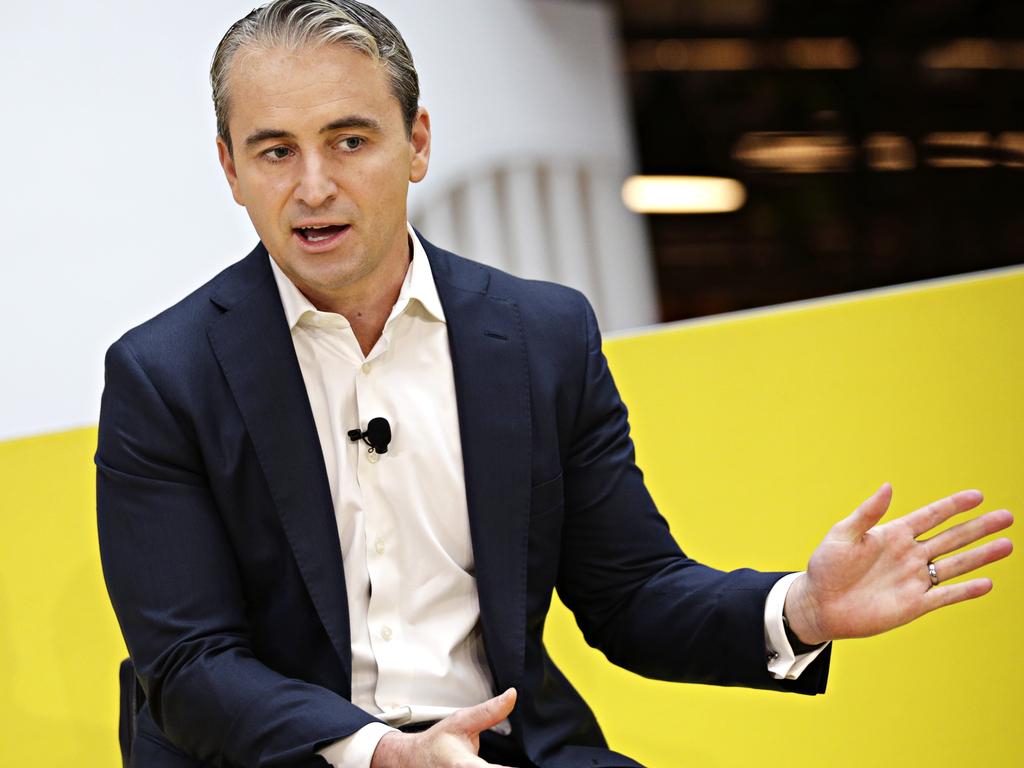CBA blasts big tech as gatekeepers and free-riders
Commonwealth Bank boss Matt Comyn wants urgent licensing requirements for big tech companies, stressing the need for payment system safety, security and competition reform.
CBA boss Matt Comyn blasted big tech players as gatekeepers and free-riders, saying the licensing requirements announced earlier this year that would apply to the likes of Apple and Google needed to come into place urgently.
In comments following his appearance at a parliamentary committee on Thursday, Mr Comyn asked for an extension of the hearing time to criticise the foreign companies for their “little contribution” to Australia and to stress that the payments legislation reform recently announced by the Albanese government was urgent.
Treasurer Jim Chalmers last month introduced proposals to expand the scope of the country’s payments regulation to give extra powers to the Reserve Bank to police all payments participants, including digital wallets developed by Apple and Alphabet’s Google.
“I commend the government for the work that they‘ve done, it’s a complex area, but there is real urgency on the … licencing and protections around consumers,” Mr Comyn said.
Speaking with a hoarse voice as he fought Covid symptoms, he said “it is some of the most important reform that’s going on both to ensure the safety and security of the payments system … but also fin the context of competition.”
While not mentioning the companies by name, Mr Comyn said “some of the big tech players, there are no greater examples of gatekeepers and quasi-monopolistic powers being leveraged. Those that seek to sort of free-ride off the infrastructure and make very little contribution to it, nor frankly to the Australian community in the context of the taxes that they pay.”
Mr Comyn has criticised Apple before, and has long called for more scrutiny of the tech giants, as it considers Apple in particular acts as a “gatekeeper” of the infrastructure that powers customer payments through mobile phone wallets, which are becoming very popular.
“There is real urgency about the licencing and protections around consumers,” he said. “And I think certainly the big end in my view, there’s absolutely no doubt that they’re under-regulated.”
He added there were “all sorts of creative definitions being invented by some of those providers to try and circumvent some of the new legislation”.
Mobile wallets such as Apple Pay and Google Pay have historically not met the technical definition of being a “participant” in a payment system, despite the fact that they play an increasingly important role in facilitating payments. The proposed regulation will likely change that.
With the largest market share of Australian banking accounts, CBA has long wanted Apple to free up use of the near field communication chip used for tap and go payments, but Apple refuses, citing security concerns.
Apple’s position has been that it is entitled to charge for the technology it has developed, which it argues promotes competition because several providers can use it. It has also argued it is uniquely positioned to offer tight security and privacy.
The popularity of mobile wallet transactions has surged to more than $93bn in 2022, from just $746m in 2018, data from the banking association shows. The number of cards registered to a mobile wallet has risen by 650 per cent to more than 15 million in 2022, from just over two million five years ago.
Besides the RBA, the Australian Competition & Consumer Commission is also known to be keeping a close watch on the market power of big players, but has not forced Apple to open up its technology.
After welcoming the government’s proposals, the tech giants called for fairness and “coherence” when implementing the changes.







To join the conversation, please log in. Don't have an account? Register
Join the conversation, you are commenting as Logout